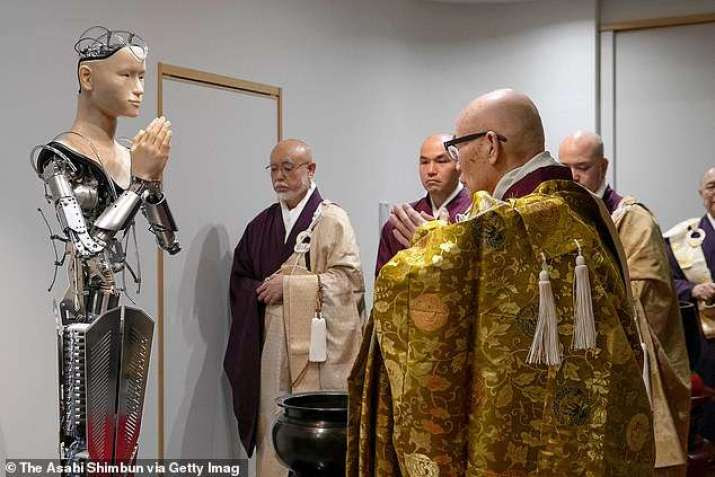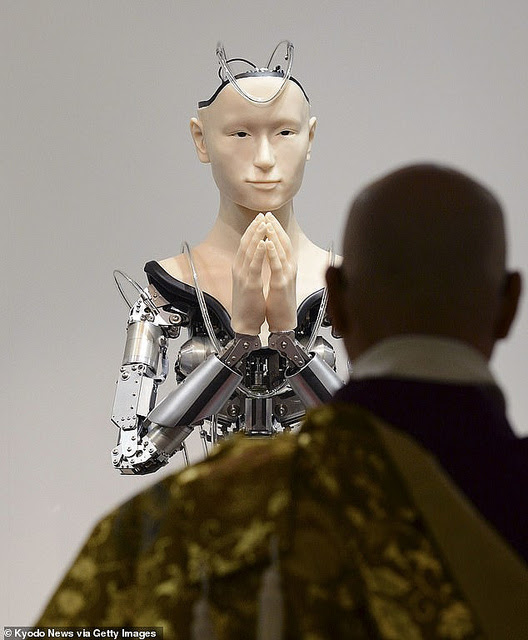
By Shyamal Sinha

Kōdai-ji formally identified as Jubuzan Kōdai-ji Jubuzan Kōdai-ji), is a temple of the Rinzai school of Zen Buddhism in Higashiyama-ku, Kyoto, Japan—the largest subtemple of the Kennin-ji branch.
Kodai-ji, a temple in Kyoto, Japan, presented the latest addition to its monastic staff on Saturday, introducing the world to an android version of Kannon Bodhisattva, the Buddhist deity of mercy, designed to explain the teachings of the Buddha in plain speech and attract a new and younger audience.
In a dimly lit hall of the 400-year-old temple, the android—named Mindar —delivered its first teaching on the Heart Sutra and humanity to an audience of monks and media representatives, before starting its official function of preaching to the public in March.
The robot is the product of a collaboration between the Zen temple and Hiroshi Ishiguro, a professor of intelligent robotics at Osaka University. Kodai-ji—built by the wife of Toyotomi Hideyoshi, the 16th-century warlord who unified Japan, to commemorate her husband—approached Ichiguro and his team with the request to build a humanoid robot or android that could share the Buddha’s teachings in a way that is easy to understand, helping to bring peace of mind to the troubled people who come to the temple for guidance.
The temple also hopes that the technological marvel might help people who usually have little connection with Buddhism to take an interest in the religion.

“Buddhism saw a phenomenal spread in the world with the emergence of Buddhist images,” stated Tensho Goto, a priest at the temple in Kyoto’s Higashiyama Ward. “We are hoping that the android Kannon will help Buddhist teachings reach the hearts of people today.” (The Asahi Shimbun)
“We want many people to come to see [the robot] to think about the essence of Buddhism.” (The Japan Times)
Kannon, also known as Guanyin or Avalokiteshvara, is known as a deity who transforms at will into various forms to help relieve the suffering of humans. “[And] this time,” the temple stated during the presentation, “Kannon changed into an android.” (The Asahi Shimbun)
Midar, which cost around 100 million yen (US$909,000) to develop, is about 195 centimeters tall and weighs 60 kilograms. It is able to move its torso, arms, and head, and has a camera installed in its left eye, allowing for interaction with an audience. The android is made primarily out of aluminum, but its hands, shoulders, and face are covered in silicone designed to look like human skin, allowing for a more “human” appearance, especially when it is dressed in robes.
The general public will be able to see Midar from 8 March–6 May, when the robot is scheduled to preach to the public. Although the robot is programmed to deliver sermons from the Heart Sutra in Japanese, translated versions of the sermons into English and Chinese will be projected onto a screen next to the android for foreign visitors.
Although about 67 per cent of Japan’s 127 million people identify as Buddhists, most seldom see the inside of a temple except for during traditional ceremonies to mark the New Year and funeral rites for deceased family members. Buddhism may be approaching something of a crisis point in Japan, with 27,000 of the country’s 77,000 Buddhist temples expected to close over the next 25 years, reflecting shrinking populations in small rural communities and a loss of faith in organized religion among the country’s population as a whole.
The view of other nearby Kyoto temples and down into the city center is stunning. Kodaiji is illuminated in the spring, autumn and late summer and open to the public for special evening viewing sessions.
The gardens of Kōdai-ji are a nationally designated Historic Site and Place of Scenic Beauty.











